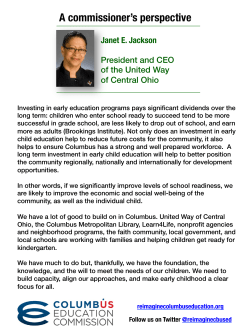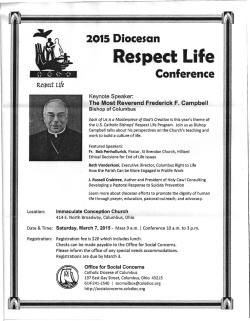
The property tax system currently in place in Muscogee County is
March 2015 Prepared by: Benjamin F. Blair The property tax system currently in place in Muscogee County is commonly referred to as the “Property Tax Freeze”. The property taxes of residential homes receiving a homestead exemption are based upon the assessed value of a home at the time a home is purchased. This assessed value is then fixed or “frozen” until the property is sold or improved, at which time the value of the home is reassessed and then frozen at the newly reassessed value. The Butler Center for Business and Economic Research was contacted by the Columbus Consolidated Government to provide an analysis of the fiscal effects of the freeze and possible reforms on the County and its residents. In a series of four information briefs we present a summary of our findings. In this brief, the third of the series, we describe the effect of the freeze on historical property tax revenues collected by Columbus. The Historical Effect of the Property Tax Freeze on City Property Tax Revenues Using property tax data provided by the City Tax Assessor’s Office from 2003-2014 we examine the impact of the freeze on the city operating property tax revenues from all homestead properties since 2003. Specifically, we examine what would have happened if the property tax freeze had been sunset in 2003 with the following conditions: • the fair market value of each homestead home in 2003 is the frozen fair market value provided in the 2003 property tax register. • in each year after 2003, the fair market value of all homestead properties is adjusted by the actual rate of inflation in that year. The millage rates and inflation rates used in the analysis are described in the figure below. The Butler Center for Business and Economic Research (706) 507-8173 butlercenter.columbusstate.edu The Effect of the Freeze on Historical Tax Revenue The graph below compares the taxes that would have been collected under this scenario with those that were actually collected. Accumulated Difference in Property Taxes = $28.8 Million $4,450,488 City Property Tax Revenues if Freeze Had Been Sunset in 2003 Actual City Property Tax Revenues from Homestead Homes Under Current Freeze The sunset of the property tax freeze in 2003 as described above would have resulted in increased city operating tax revenues each year. By 2014, the City would have collected nearly $4.5 million more in property taxes from homestead properties. This additional revenue could have been used to provide a mixture of additional City services and tax relief. Given the tax reform described above, the city millage rate could have been reduced by 3.3 mills in 2014 and still generated the same city operating taxes that were collected under the freeze. The school system millage rate could have been reduced by approximately 4.4 mills. There are many possible alternatives for property tax reform if Muscogee County residents elect to do so. In the next brief in this series we examine one of these alternatives put forth by the Mayor of Columbus. Author Benjamin F. Blair is the Sarah T. Butler Distinguished University Chair in Business and Finance, director of the Butler Center for Business and Economic Research and Associate Professor of Economics at Columbus State University. (706) 507-8173; blair_benjamin@columbusstate.edu The Butler Center for Business and Economic Research (706) 507-8173 butlercenter.columbusstate.edu
© Copyright 2025





![[Circular] Freezed Securities in Central Depository System (CDS)](http://cdn1.abcdocz.com/store/data/000811275_1-6c54fe27c99075226a893a7c08a16435-250x500.png)









